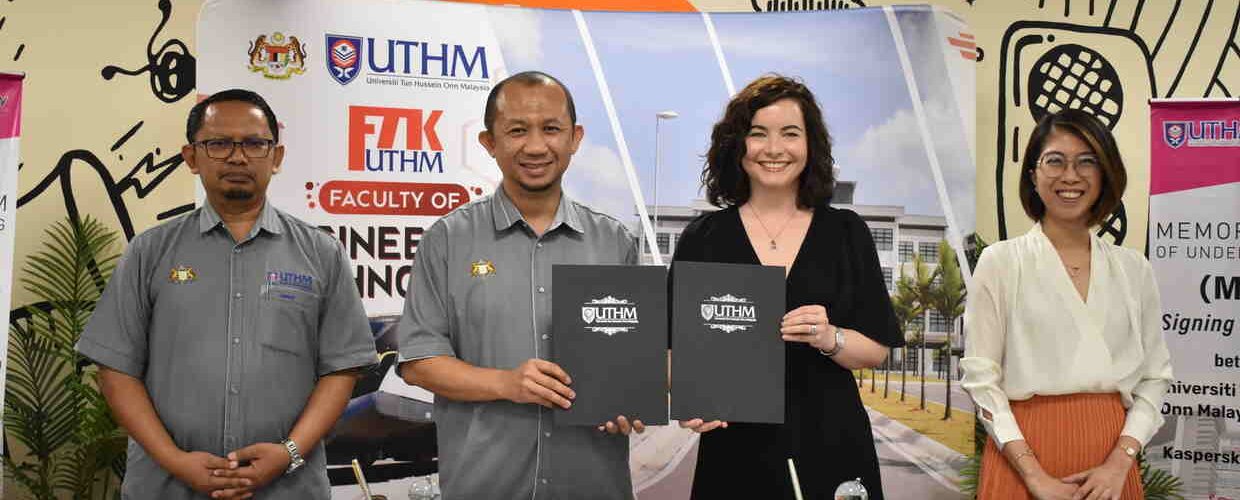In a bid to address Malaysia’s critical shortage of cybersecurity professionals, global cybersecurity company Kaspersky has signed a Memorandum of Understanding (MoU) with Universiti Tun Hussein Onn Malaysia (UTHM) to strengthen the university’s Information Security Programme with global expertise, hands-on training and real-world threat intelligence.
The collaboration aims to support national priorities in developing future-ready digital competencies by equipping educators and students with in-demand skills needed to fortify Malaysia’s digital ecosystem.

Bridging the cybersecurity skills gap
Recent figures underscore Malaysia’s urgent need for cybersecurity talent. Kaspersky reported that ransomware detections in the country surged 153% year-on-year, with 27.9 million online threats recorded in 2024 alone. A joint study by the Department of Skills Development, The Centre for Instructor and Advanced Skill Training (CIAST), and Cybersecurity Malaysia (CSM) projects that the nation will need at least 27,000 cybersecurity experts by 2025, a target it is still struggling to meet.
With Malaysia’s cybersecurity market forecast to hit US$2.17 billion by 2030, closing this skills gap will be vital for sustaining digital growth and securing critical infrastructure.
“Cybersecurity is the very foundation of trust in our digital world and building its talent is as crucial as advancing infrastructure and innovation. Through our collaboration with UTHM, we are investing in a new generation of Malaysian cyber defenders – equipping them with world-class knowledge, skills and resilience to safeguard the nation’s progress and contribute to a safer and more secure digital future for the global community,” said Evgeniya Russkikh, Head of Cybersecurity Education at Kaspersky Academy.
Enhancing curriculum and industry readiness
Under the MoU, Kaspersky will work with UTHM to enrich its Information Security curriculum with industry-developed courses and teaching materials, provide faculty development opportunities and expose students to practical cybersecurity tools and methodologies.
These initiatives are expected to expand UTHM’s academic and research activities while improving graduate employability in line with industry demands.
“At UTHM, we are committed to prepare our students to be competitive and resilient in an increasingly digital and interconnected world. This partnership with Kaspersky not only strengthens our academic capabilities but also enhances our global connections, giving our students and faculty access to industry expertise in cybersecurity,” said Professor Dr. Afandi Bin Ahmad, Provost of the UTHM Pagoh Branch Campus.
Strengthening cyber resilience
UTHM was recently recognised as one of six Malaysian universities contributing to research collaboration and talent development in cybersecurity at the Cyber Defence and Security Exhibition (CYDES) 2025. The new partnership with Kaspersky builds on a growing ecosystem of collaboration between academia and industry to secure Malaysia’s digital future.
For Kaspersky, the MoU extends its ongoing commitment to nurturing cybersecurity education and awareness in Malaysia. Over the years, the company has partnered with leading universities such as Universiti Malaya and Universiti Kuala Lumpur to strengthen curricula and offer specialist training. Beyond higher education, Kaspersky has worked with schools, NGOs and grassroots communities to deliver workshops and awareness programmes aimed at fostering digital resilience from an early age.
By deepening its collaboration with UTHM, Kaspersky hopes to help Malaysia close its cybersecurity talent gap and strengthen the nation’s standing as a regional hub for digital resilience and innovation.












Add comment